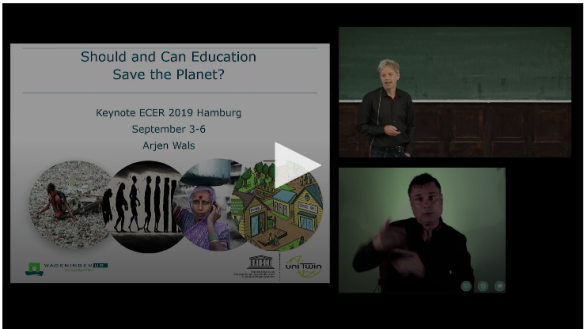
Last month I attended the European Conference on Educational Research (ECER in Hamburg this year. Around 3000 participants from over 60 countries attended the conference. Since the overall theme was ‘Education in an Era of Risk – the Role of Educational Research for the Future’ I had the honor of being asked as one of the plenary keynote speakers, as was my good colleague and friend Heila Lotz-Sisitka from Rhodes University in South Africa who, like myself, is a member of ECER/EERA’s subnetwork on Environmental and Sustainability Education (Network 30), one of the youngest and rapidly expanding networks.
The title of my talk was: Should and Can Education Save the Planet? In the talk I outlined the current global sustainability challenges form a learning perspective and I introduced the concept of sustainability-oriented ecologies of learning. I also introduced the notion of sustainability Bildung in which Biesta’s three tasks of education are reconfigured with Planet in mind to become eco-subjectification, eco-socialization and eco-qualification.
You can watch the full keynote here (also understandable for the deaf and hearing impaired as the talk was kindly supported with sign language).
Here is the official ECER2019 abstract of the keynote.
Education unwillingly has become a key mechanism for fostering economic development, innovation and growth. In the meantime, humanity is facing a range of sustainability issues that include: rising inequity, loss of democracy, runaway climate change and mass extinction. These issues can be so overwhelming that they can easily lead to apathy and despair which will only make them bigger. We appear to be at a tipping point where the decisions we make about how to live together will be crucial for the future of our planet. There is no better time than now to ask: What is education for? What if education would serve people and planet rather than just or mainly economic interests? Is this a role education should play? And, if so, what does such an education look like?
Based on emerging research and practices from around the world, I will sketch forms of education and learning that are: responsive, responsible and transformative in light of global sustainability challenges. Sustainability here is not seen as another subject to be added to an overcrowded curriculum, but rather as a continuous quest for finding ways to live more equitably, meaningfully and healthier on the Earth without compromising planetary boundaries and the futures of the coming generations. Such a quest requires a more relational pedagogy that can help establish deeper connections with people, places and other species. Such a pedagogy not only invites reflection on values and ethics, and the utilization of diversity, but also the critiquing and transgressing of the structures and systems that make living unsustainably easy and living sustainably hard.


